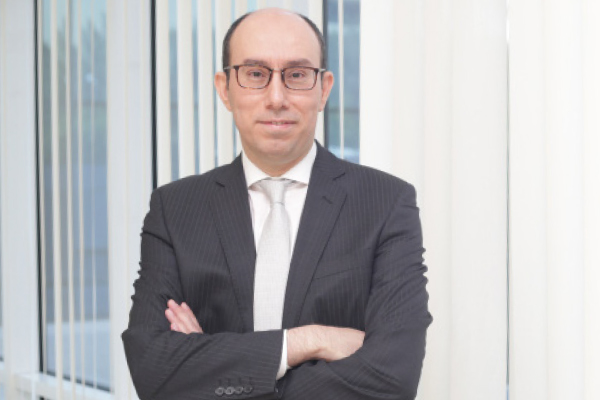Striving to be the best in the business, Samer Abu Hayah, Director of IT at Al Zahra Hospital, opted for an upgraded wireless network to cater to the needs of both the hospital’s staff and patients.

IT is one of the most important underpinning services in a hospital” says Samer Abu Hayah, Director of IT, Al Zahra Hospital. Even for an acute care facility like this one, which opened just three years ago, Hayah’s IT department has a heavy involvement with various daily tasks undertaken by both the healthcare and administration staff within the hospital. “We are trying to create the very best in terms of a care delivery model with both excellent clinical outcomes and the best patient experience,” says Hayah. Aiming to take a major tech leap in delivering this mandate, Hayah sought to update Al Zahra’s LAN using Aruba’s access points.
“Our mission in IT is to strive to support our care delivery team who serve our patients, so we need to support them with any systems or services that they need. Our department’s objectives come from the care team, not the IT team,” says Hayah. “We had a basic Wi-Fi system before, but the coverage, connectivity and speed were a challenge for us. We needed to expand our wireless network everywhere if we were to implement the IT strategies that we wanted.”
A variety of wireless solutions were installed over a period of 12 working days. “We had no challenges at all in terms of deployment. It was a seamless integration with our current system,” says Hayah.
The solution has resulted in practical benefits for the hospital from both a business and technology perspective. “Aruba wireless has enabled us to implement a lot of initiatives, such as BYOD,” says Hayah. “We all know the benefits of deploying an initiative like this, but one of the major benefits for us has been that it allows caregivers to access patient information at the bedside. It helps create a good patient experience when the physician is discussing a patient’s results with them right there, rather than saying “I’ll get back to you with that later,” and then returning after three or four hours, or forgetting completely.”
Not only has this helped improve the patient experience, but it has saved “45-50 percent” of the staff’s time in accessing the required information, according to Hayah. By connecting to one of the 200+ wireless access points across the hospital, both healthcare and admin staff alike can securely access clinical or business related information as soon as it becomes available.
But the network can also be accessed with ease by a variety of visitors within the hospital’s vicinity, depending on their role.
“We are extending the Wi-Fi access to our guests and community-based doctors, as well as patients and their families. The Internet is now part of Dubai’s Smart City initiative; it’s everywhere from airports to cafes to restaurants, so now it’s also part of our information processes as a smart hospital,” says Hayah.
“When we designed the solution, it was driven by demand, so we’ve mainly targeted the patient areas using the advanced point 205, because it will be accessed by a lot of users – especially when people have three or four mobile phones,” he says. “But there’s nowhere left in the hospital now that doesn’t have Wi-Fi; we wanted our staff to be connected to their systems around the clock because patient care is at stake, so we’ve implemented it everywhere. Whenever connections break, patient care declines.”
Patient experience
The solution has also enabled Hayah and his team to look towards future projects within the hospital to further his vision of being the best in patient experience.
“The next phase of our programme will involve patients having tablets at their bedsides which they can access at any time,” he says. “They will have control over their entertainment, meal ordering, communicating with their care team, viewing their recent results, seeing the goals that have been set for them and understanding what they need to do to achieve them; engaging with the patients in this care delivery model is something that we are planning for, and this wouldn’t be possible without Aruba running in the back rooms.”
Known as the ‘One for You’ system, the project is set to be in the hospital’s budget for next year’s patient experience solutions.
Mobility
Increasing mobility was one of the main focuses for Al Zahra in this new era of wireless technology. “One of the most important things that we monitor is the hospital information system (HIS) – which empowers the care team/care givers to have an updated information log of the most recent medical records for their patients to support and enhance the decision making processes that they undergo,” says Hayah. Physicians now also have access to ‘Up to Date’ – a clinical database application which can be accessed on their smart devices to assist them in diagnosing and treating conditions that may not already be stored on the HIS. “Physicians can key in the patient’s details, their results or vital signs that they are showing, and the app will then support them with what decision they should make,” explains Hayah. “We used to source our information from Google and Wikipedia, but when you do that you have to summarise the details yourself and form a conclusion.”
The upgraded wireless network has enabled both hospital staff and patients alike to experience the positive benefits brought on by its implementation. “It has played a big role in the growth of the hospital, for both operational and clinical outcomes, whilst also supporting our patient experience,” says Hayah.
Well aware of the need to continue innovating, Hayah is already thinking ahead in terms of what else needs doing to ensure his department’s operations keep running smoothly. “I think we’re moving more towards smart computing and smart devices, where you will have a wireless environment – a virtual office – in which you can work from anywhere in the world and not be tied to one machine,” he says. “We have planned with Aruba to make all our networks wireless. If you consider the future of technology in healthcare, it will need supporting by high-speed wireless networks which will require a very stable and scalable backbone to cope with the volume of traffic.”





